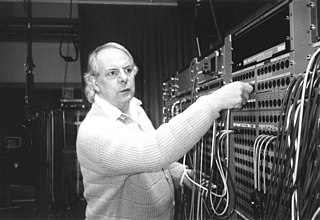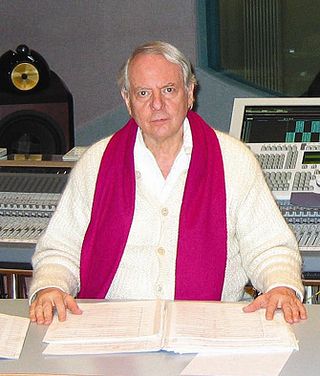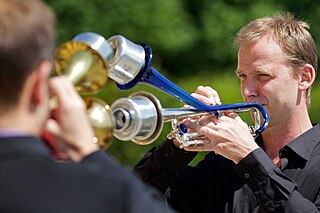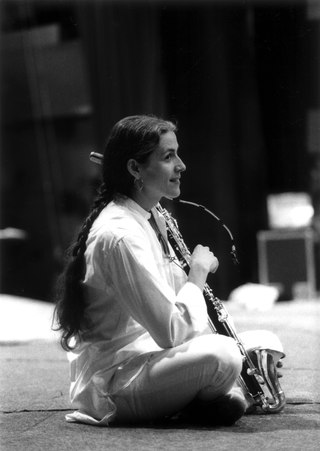
Karlheinz Stockhausen was a German composer, widely acknowledged by critics as one of the most important but also controversial composers of the 20th and early 21st centuries. He is known for his groundbreaking work in electronic music, having been called the "father of electronic music", for introducing controlled chance into serial composition, and for musical spatialization.

Licht (Light), subtitled "Die sieben Tage der Woche", is a cycle of seven operas composed by Karlheinz Stockhausen between 1977 and 2003. The composer described the work as an "eternal spiral" because "there is neither end nor beginning to the week." Licht consists of 29 hours of music.

The Helikopter-Streichquartett is one of Karlheinz Stockhausen's best-known pieces, and one of the most complex to perform. It involves a string quartet, four helicopters with pilots, as well as audio and video equipment and technicians. It was first performed and recorded in 1995. Although performable as a self-sufficient piece, it also forms the third scene of the opera Mittwoch aus Licht.

The Klavierstücke constitute a series of nineteen compositions by German composer Karlheinz Stockhausen.
Sirius: eight-channel electronic music and trumpet, soprano, bass clarinet, and bass is a music-theatre composition by Karlheinz Stockhausen, composed between 1975 and 1977. It is Nr. 43 in the composer's catalogue of works, and lasts 96 minutes in performance.

Marco Blaauw is a Dutch trumpet soloist known for his work in the field of new music and with Cologne-based contemporary music group Ensemble Musikfabrik. He plays a double bell trumpet, an invention that has allowed for numerous new compositions for trumpet, including those by Ernst von Siemens Music Prize winner, Rebecca Saunders. Blaauw is a consistent faculty member at the Darmstadt Summer Course, the Stockhausen Courses Kürten, the Lucerne Festival, and the Chosen Vale International Trumpet Seminar.

Klang —Die 24 Stunden des Tages is a cycle of compositions by Karlheinz Stockhausen, on which he worked from 2004 until his death in 2007. It was intended to consist of 24 chamber-music compositions, each representing one hour of the day, with a different colour systematically assigned to every hour. The cycle was unfinished when the composer died, so that the last three "hours" are lacking. The 21 completed pieces include solos, duos, trios, a septet, and Stockhausen's last entirely electronic composition, Cosmic Pulses. The fourth composition is a theatre piece for a solo percussionist, and there are also two auxiliary compositions which are not part of the main cycle. The completed works bear the work (opus) numbers 81–101.

Montag aus Licht is an opera by Karlheinz Stockhausen in a greeting, three acts, and a farewell, and was the third of seven to be composed for the opera cycle Licht: die sieben Tage der Woche. The libretto was written by the composer.

Suzanne Stephens is an American clarinetist, resident in Germany, described as "an outstanding performer and tireless promoter of the clarinet and basset horn".

Kathinka Pasveer is a Dutch flautist.

In Freundschaft is a composition by Karlheinz Stockhausen, number 46 in his catalogue of works. It is a serial composition for a solo instrument, first for clarinet, and later arranged by the composer for many other instruments, often in friendship to specific performers.

Sonntag aus Licht is an opera by Karlheinz Stockhausen in five scenes and a farewell, to a libretto written and compiled by the composer. It is the last-composed of seven operas that comprise the cycle Licht (Light). Its stage premiere in 2011 was posthumous, more than three years after the composer's death.

Samstag aus Licht is an opera by Karlheinz Stockhausen in a greeting and four scenes, and was the second of seven to be composed for the opera cycle Licht: die sieben Tage der Woche. It was written between 1981 and 1983, to a libretto written by the composer and incorporating a text by Saint Francis of Assisi, and was first staged in Milan in 1984.

Donnerstag aus Licht is an opera by Karlheinz Stockhausen in a greeting, three acts, and a farewell, and was the first of seven to be composed for the opera cycle Licht: die sieben Tage der Woche. It was written between 1977 and 1980, with a libretto by the composer.

Dienstag aus Licht is an opera by Karlheinz Stockhausen in a greeting and two acts, with a farewell, and was the fourth of seven to be completed for the opera cycle Licht: Die sieben Tage der Woche. It was begun in 1977 and completed from 1988 to 1991, to a libretto by the composer.

Mittwoch aus Licht is an opera by Karlheinz Stockhausen in a greeting, four scenes, and a farewell. It was the sixth of seven to be composed for the opera cycle Licht: die sieben Tage der Woche, and the last to be staged. It was written between 1995 and 1997, and first staged in 2012.

Oktophonie (Octophony) is a 1991 octophonic electronic-music composition by Karlheinz Stockhausen. A component layer of act 2 of the opera Dienstag aus Licht, it may also be performed as an independent composition. It has a duration of 69 minutes.

The Rotary Wind Quintet is a chamber music composition by Karlheinz Stockhausen, the last of his three wind quintets and is Nr. 70½ in his catalogue of works. A performance lasts about 8½ minutes.

Europa-Gruss is a composition by Karlheinz Stockhausen for wind ensemble with optional synthesizers, and is assigned Number 72 in the composer's catalogue of works. It has a duration of about twelve-and-a-half minutes.

Litanei 97 is a choral composition by Karlheinz Stockhausen, written in 1997. Although the words are taken from the text-composition cycle Aus den sieben Tagen and the conductor sings and plays elements from the Michael formula used in the composer's Licht cycle of operas, it is an independent work assigned the number 74 in Stockhausen's catalogue of works. It lasts about twenty minutes in performance.
















